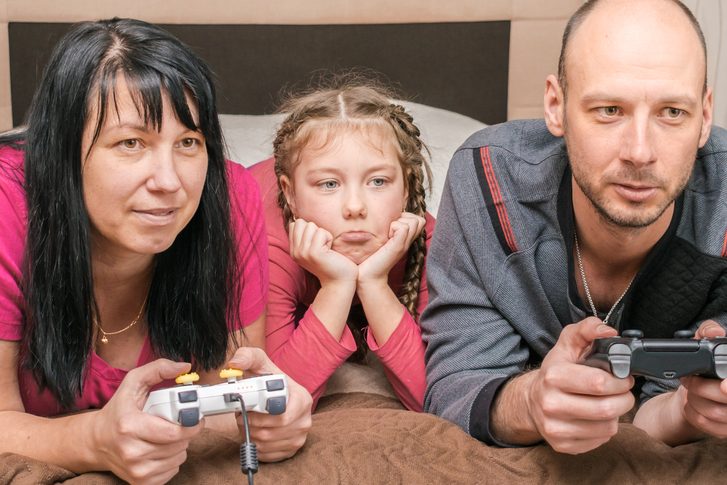
Early Exposure to Mobile Devices May Be Affecting Your Child’s Self-Regulation Skills

With today’s modern world, digital screens are everywhere and have been embedded in our everyday lives. Working on your computer, checking your phones, and watching TV are normal parts of our lives. Sometimes, we even have multiple screens at the same time.
As adults are now spending long hours in front of screens, the kids are also picking up on this behavior. There has been an increasing amount of screen time among children. According to data from the Centers for Disease Control and Prevention (CDC), children aged 8 to 10 years old spend 6 hours a day in front of a screen on the average. As for 11 to 14-year-olds, it increased to almost 9 hours a day.
There is a new study from the University of California, Davis suggesting that digital screens may be affecting child development; especially if they start using gadgets at an early age. This was published in JAMA Pediatrics.

suriyachan/Shutterstock
Early exposure to gadgets may affect the child’s development.
It’s All About Self-Regulation
For the study, the researchers sent out flyers to parents at community events and at preschools. They eventually were able to recruit 73 children aged 32 to 47 months. This research went on for 2 and a half years from July 2016 to January 2019. However, they were only able to study the data of 56 of them.
At UC Davis, the children attended 90-min sessions where their ability to self-regulate was assessed by researchers. They studied their ability to plan, monitor thoughts, behaviors, and feelings, and control. Many have associated these skills with academic and social abilities, income, and physical and mental well-being later in the child’s life.
The researchers also conducted tasks for them like slowly walking along a line to the floor, building a tower of blocks, and a delayed gratification test.
Early Screen Time Could Harm Development
The researchers then compared the results they got from the activities to information that came from parents regarding their kids’ screen time. The data included how old these children were when they first saw a screen and how long they spend in front of it.

Maximumm/Shutterstock
Parents should limit their kids’ screen time or delay introducing it to them.
It was found out that kids who began using screen media earlier in life exhibit lower self-regulation skills. This is also true for those who use mobile devices currently. The measures for screen time didn’t predict the perception of the parents, however. As a precaution (and also because of the result of their findings), researchers advise parents to limit the screen time of their preschool children.
TVs and Computers May Be Safer Than Mobile Devices
It was also revealed that traditional electronic devices like television and desktop computer don’t pose as much threat as mobile devices. Being exposed to traditional devices doesn’t correlate to self-regulation.
This may be because calls for more child-friendly educational content and warnings for parents to monitor their child’s television activity have been effective. It is also likely due to television units and desktop computers being fixed in one place compared to mobile devices that you could take anywhere.

Victoria 1/Shutterstock
Since they are in a fixed area and usage can be better controlled, TVs and desktop computers are deemed safer.
What Should Parents Do?
Based on the findings, parents should consider delaying their kids’ exposure to screen media. Another tactic is to limit their use of mobile devices while still making sure that you provide positive, developmental, and educational materials.
It is also important to note that this study was based on just a small sample of over 50 children who mostly came from middle-class families. The changes that the researchers observed regarding self-regulation may not be that meaningful since the tests don’t predict parents’ assessments of their kid’s self-regulation.
Long-term studies with a larger number of respondents need to be carried out. Researchers need to have more accurate assessments of screen use before they can confirm that there is a link between screen time and child development. For the research team over at UC Davis, it’s just the start.
More in Mind & Mental
-
`
Here’s Everything You Need to Know About Open Relationships
An open relationship is a consensual arrangement where partners agree to engage in romantic or sexual relationships with other people. Unlike...
June 6, 2024 -
`
Explore the Multifaceted Goals of Meditation
What is the goal of meditation? If you have ever found yourself asking this question, you are not alone. Meditation has...
May 31, 2024 -
`
When is National I Love You Day Celebrated? Mark Your Calendar
Life can get hectic, and sometimes amidst the daily grind, we forget to express our love and appreciation for the phenomenal...
May 23, 2024 -
`
When’s the Best Time of Day to Fish?
For any angler, a successful fishing trip hinges on several factors. But one of the most crucial elements is timing. Knowing...
May 14, 2024 -
`
What Mental Illness Does Britney Spears Have? Discovering the Answer
Britney Spears, a name that resonates with millions around the globe, goes far beyond the glitz and glamour of her stardom....
May 7, 2024 -
`
Here Are Some Easy Ways To Say No To Unrealistic Expectations In Your Relationship
If you are in a relationship, you should constantly work on improving it. Some early lovebirds fall in love too quickly...
May 3, 2024 -
`
Therapy? Medication? What Are the Treatments for PTSD
Post-Traumatic Stress Disorder (PTSD) is a common after-effect of traumatic events. It can be a debilitating condition, but the good news...
April 25, 2024 -
`
Courting vs Dating – Which Relationship Path is Right for You?
In today’s fast-paced world, the terms ‘courting’ and ‘dating’ often swirl around in conversations about relationships. While some people may use...
April 23, 2024 -
`
Essential Mexico Travel Tips for a Seamless Adventure
Mexico, a land of vibrant culture, breathtaking landscapes, and mouthwatering cuisine, beckons travelers from across the globe. But before you embark...
April 16, 2024















You must be logged in to post a comment Login